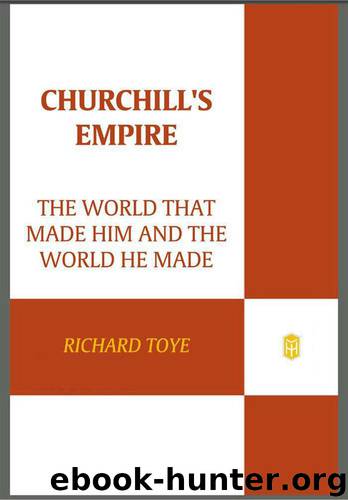Churchill's Empire: The World That Made Him and the World He Made by Richard Toye

Author:Richard Toye [Toye, Richard]
Language: eng
Format: epub, mobi
ISBN: 9780330455770
Publisher: Pan Macmillan
Published: 2011-08-04T22:00:00+00:00
IV
Menzies was no lone critic, however. The war was not going well and Churchill had to work constantly to maintain his position in Parliament. The German invasion of the Soviet Union in June 1941 brought Britain another ally, but the bigger fish, America, had still to be landed. In August, Churchill met Roosevelt at a landmark conference held on board the US cruiser Augusta and the British battle-cruiser Prince of Wales at Placentia Bay, Newfoundland. Churchill would greatly have welcomed a US declaration of war, but had to be content with the promulgation of the Atlantic Charter, a joint statement of broad principles about the future of the world. FDR was eager to use the conference to promote an anti-imperialist agenda. Although the question of colonial freedom was not discussed explicitly, two points of the Charter were of crucial significance in relation to imperial questions.101
As finally agreed, Point 4 stated that Britain and America would ‘endeavour, with due respect for their existing obligations, to further the enjoyment by all States [. . .] of access, on equal terms, to the trade and to the raw materials of the world which are needed for their economic prosperity’.102 The original US draft of this was clearly intended as an assault on the imperial preference system, a form of trade discrimination. Churchill’s friend Lord Beaverbrook, now Minister of Supply, who was at the conference, was highly concerned.103 Churchill’s own position, as a former free trader, was more than a little ironic. Although he had not been keen on the Ottawa Agreements, he knew that to tear them up without consulting the Dominions would provoke outrage. He was now, furthermore, leader of the Conservative Party. He told Mackenzie King: ‘When the tariffs were discussed, while he, himself, was not sympathetic to the Conservative position, he nevertheless had felt it his duty to stand up for it.’104 The British successfully pressed for the inclusion of the qualifying words about ‘existing obligations’ and for the removal of a reference to ‘discrimination’.105 This was achieved in spite of the powerful lever the Americans possessed in the form of British dependence on their economic aid. But in spite of Churchill’s efforts to protect the interests of the Dominions, he had not actually consulted them on the text of the Charter before its release. Mackenzie King, often touchy about such matters, observed that there had been enough time to run it past the British Cabinet but that Canada had been ‘ignored’. He complained to Malcolm MacDonald, Britain’s High Commissioner, ‘It was the way the British lost their friends, wanting them in foul weather and ignoring them in fair.’106
Point 3 of the Atlantic Charter was also to prove controversial, although its text was settled easily enough. Under it, the two governments declared that ‘they respect the right of all peoples to choose the form of government under which they will live; and they wish to see sovereign rights and self-government restored to those who have been forcibly deprived of them’.107
Download
Churchill's Empire: The World That Made Him and the World He Made by Richard Toye.mobi
This site does not store any files on its server. We only index and link to content provided by other sites. Please contact the content providers to delete copyright contents if any and email us, we'll remove relevant links or contents immediately.
| France | Germany |
| Great Britain | Greece |
| Italy | Rome |
| Russia | Spain & Portugal |
Fanny Burney by Claire Harman(25779)
Empire of the Sikhs by Patwant Singh(22167)
Out of India by Michael Foss(16310)
Leonardo da Vinci by Walter Isaacson(11897)
Small Great Things by Jodi Picoult(6088)
The Six Wives Of Henry VIII (WOMEN IN HISTORY) by Fraser Antonia(4786)
The Wind in My Hair by Masih Alinejad(4421)
The Lonely City by Olivia Laing(4113)
The Crown by Robert Lacey(4100)
A Higher Loyalty: Truth, Lies, and Leadership by James Comey(4028)
The Iron Duke by The Iron Duke(3637)
Millionaire: The Philanderer, Gambler, and Duelist Who Invented Modern Finance by Janet Gleeson(3566)
Sticky Fingers by Joe Hagan(3451)
Alive: The Story of the Andes Survivors by Piers Paul Read(3304)
Papillon (English) by Henri Charrière(3265)
Joan of Arc by Mary Gordon(3254)
Stalin by Stephen Kotkin(3082)
Aleister Crowley: The Biography by Tobias Churton(3016)
Ants Among Elephants by Sujatha Gidla(2922)
